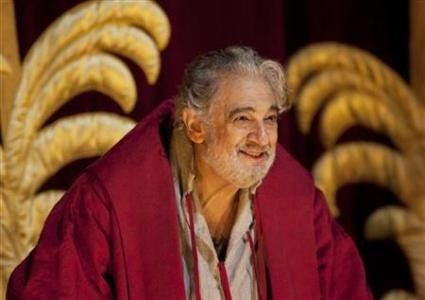Opera Star Domingo Lauded in London as One of a Kind

Spanish singer Placido Domingo marked his 40th anniversary at London's Royal Opera House with a gala concert late Thursday that was greeted with one of the longest and loudest curtain calls the venue has seen in years.
Yet amid the celebrations for the 70-year-old's distinguished career, there came warnings that his like may not be seen again in a time when finding the next big thing could deny singers the time to develop into genuine greats.
For one, unlike many other members of the opera royalty, Domingo does not do hissy fits, tantrums and last-minute cancellations.
Instead, it seems, the man with the golden voice and acting abilities appears to be loved just as much for his professionalism and generosity on and off stage.
You'll never hear anyone in the industry say a bad word about him, said veteran opera photographer Rob Moore, who was at Covent Garden in 1971 when Domingo made his debut there.
The sellout crowd paying up to 225 pounds ($360) a seat saw Domingo perform the final acts of three of his favorite Verdi operas.
In Otello, he sang the title role written for a tenor, the register that made him one of the most famous singers of his generation with Luciano Pavarotti and Jose Carreras.
Domingo recently switched to baritone, and performed the title roles in the closing scenes of Rigoletto and Simon Boccanegra.
Adrian Hamilton of the Independent newspaper said in his four-star review that Domingo may have lost the full throat of youth, but argued his dramatic powers were at their height.
No-one dies like Placido Domingo, he wrote of his on-stage demise in Simon Boccanegra.
They don't make them like that any more, he added. And more's the pity. Domingo belongs to Grand Opera in a way that few male singers do today. He's also a real trouper in a way that virtually none are.
IMPATIENCE THREATENS FUTURE
Antonio Pappano, music director at the Royal Opera House, who conducted Domingo, said the experience was less nerve-racking than some might expect.
It's incredibly comforting because ... in his voice there's history and there's time, he said backstage after the performance.
But he also voiced concerns that future Domingos may not be given space to develop.
We live in a world where everybody is, you know, 'the next young thing' and 'the next prodigy' and the 'next superstar kid', and now you see what a real career is about. It's built over time.
There's a great impatience in careers. If you've got a beautiful lyrical voice, your voice can grow over time, but if you push it too soon into heavier roles this takes a toll on the voice. We've seen it happen over and over and over again.
DON'T CLAP TOO MUCH
For Domingo, the Royal Opera House was in some ways unbeatable, not least because audiences did not applaud for too long.
This house has always been enormous, I mean the warmth of the public, the company like a family, he told Reuters and London's Evening Standard in a backstage interview.
Still dressed in the long gowns of his Simon Boccanegra costume and surrounded by fans and colleagues, he added: I think the public in London is amazing because you know in some theatres maybe you have anything between half and hour and 40 minutes of curtain calls.
In London I think what's so absolutely amazing is the way they react and they kind of respect the artist ... 10 minutes of London applause, it is equivalent of any other house's half an hour or 40 minutes because it's really like an explosion.
Sharing the stage with Domingo at the concert were four Covent Garden debutants, underlining the singer's engagement with discovering new talent.
This is my big thing, to be able to create new artists with my competition and with my young artist programs, Domingo said, speaking in English. It's really the future when you see these people.
Asked whether he was optimistic about opera's future, he replied: I believe opera is forever, as long as there is sensibility in people.
And addressing the economic crisis that has put the notoriously expensive art form out of the reach of many fans, he said: Always there have been crises and this is of course one of the most difficult times.
I think it's possible to encourage people to work more with co-productions and sometimes you have to cut a little bit the repertoire and the performances, but it is going to be back.
© Copyright Thomson Reuters {{Year}}. All rights reserved.





















